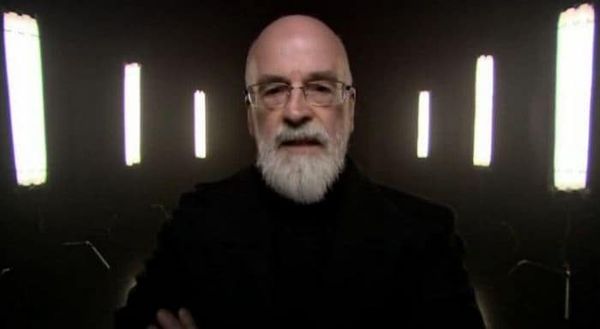Eye For Film >> Movies >> Terry Pratchett: Choosing To Die (2011) Film Review
Terry Pratchett: Choosing To Die
Reviewed by: Val Kermode

“Is it possible for someone like me, or like you, to arrange for themselves the death that they want?”
That is the question with which Terry Pratchett introduces this harrowing but very necessary film. He goes on to say “I'd like to enjoy life for as long as I can squeeze the juice out of it. And then I'd like to die, but I don't know how and I don't know when.”

Now in his early sixties and working on his 38th novel, Terry knows that he is in the early stages of Alzheimer's. He can no longer type and writes by dictating to his assistant, Rob. But he worries that soon he won't be able to find the words and will not be able to write at all. So he is exploring the option of assisted dying. The problem for people with Alzheimer's is that they have to start making decisions about this early, while the mind is still clear enough. Terry has contacted Dignitas, the assisted death clinic in Switzerland, and in this film he goes to meet two men, 30 years apart in age, who both have degenerative illnesses and have booked appointments at the clinic.
One is Peter Smedley, whom Terry visits at home with his wife, and the other a very young-looking 42 year-old, Andrew. Both are men of strong character and dignity, who have been thinking about this for a long time. Peter and his wife discuss Dignitas with Terry. Despite being clear that this is now Peter's choice, they admit that there is something rather distasteful about the procedure of going to a clinic to die. In one of the film's welcome moments of humour, Peter's wife says of the clinic director “He's German, you know.” Then , to camera, “Oh, I suppose I shouldn't say that.”
Terry's wife doesn't want to talk in this film, and what we see of Peter's wife reminds us that the choice of assisted death is possibly hardest for those left behind. At first we see Andrew without his family. He has decided that he doesn't want to wait for life to become impossible before he arranges his death. But later, in one of the most heart wrenching scenes, his mother talks to camera, saying that although this is absolutely not what she wants, she knows that's selfish and it has to be Andrew's decision.
Terry also explores the alternatives, going to Belgium to see the widow of writer Hugo Claus, who chose assisted dying at home in her arms, still illegal here in the U.K.
Then he visits Mick, an ex- taxi driver with MS who has chosen to live out his remaining life in a hospice, “I thought – let's have another roll of the dice.” He is full of praise for the hospice. But in this country should that be the only choice available? Terry says that as a journalist he's seen many suicides and certainly wouldn't recommend that.
When they learn that Peter and Andrew will both be going to Dignitas in the same week, Terry and his film crew decide to go there. It's in Zurich, it's just before Christmas, and it's snowing prettily as they find the clinic – on an industrial estate. No one wants a clinic like this in a residential area.
The director, Ludwig Minelli, shows them round and explains that most of the people who make enquiries don't follow it through. But just knowing that you have the option can make life more bearable.
Andrew has already had the two doctors' assessments required and is to die tomorrow. We see Terry and Rob listening to Andrew's choice of music as they know it's the time he must be dying. When they planned to go to Zurich, the crew were not expecting to film a death, but Peter and his wife invite them to do this. This is inevitably the most harrowing part of the film and the most controversial. I can only report that the calmness and the dignity of Peter and his wife were astounding, and the episode was filmed with great respect and restraint.
There is much here to think about. This is a beautiful film with a well-crafted soundtrack. Is this a flaw? Is the film too emotional, distracting us from the arguments? Each of us will ask our own questions and reach our own conclusions. Terry Pratchett ends the film with his own uncertainty, questioning whether he could be brave enough to do this.
I feel grateful to Terry for making this film and I urge you to see it.
Reviewed on: 12 Jun 2011















